
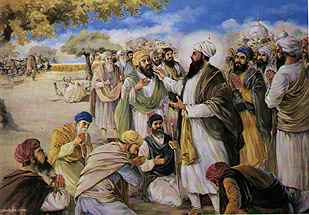
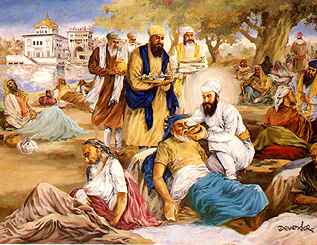
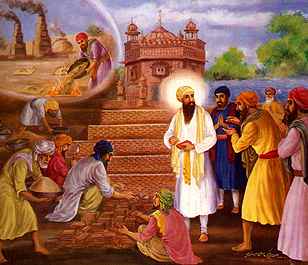
Bhai Banno's services in the construction of the Harimandir are significant. On its completion, someone asked Guru Ji as to who should be served the platter first according to the established practices. Guru Ji said, "Whoever has done service everyday by remaining modest and keeping his low profile." Guru Arjan honoured Bhai Banno by placing the first platter of the feast before him.
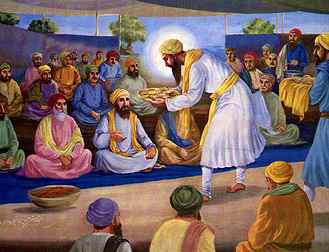
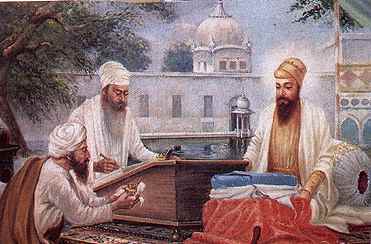
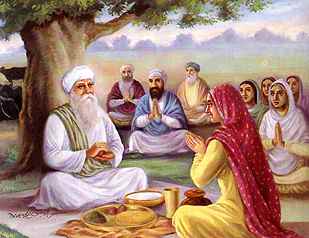
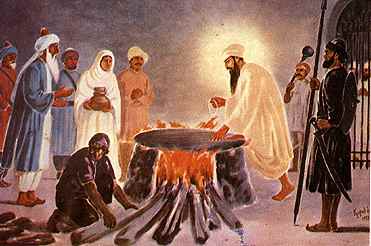
Guru Arjan - the first martyr.
The atmosphere was highly charged. Jahangir was hot with rage, so were Sulhi Khan and Sulbi Khan. Prithi Chand burning with jealousy. All these prompted Jahangir to torture Guru Arjan to the extreme. He was made to sit on a hot plate with hot burning sand being poured on him. The Guru breathed his last in 1606 Ad by going to the River Ravi for a dip and eventually disappearing.
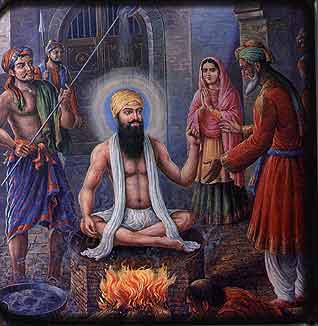
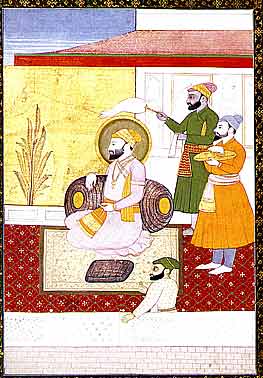
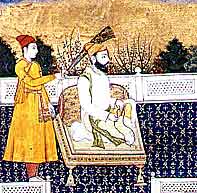
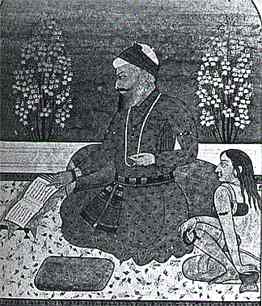
Guru Arjan - a painting from the Lahore Museum (courtesy F. Aijazzudin).
Guru Arjan dressed in an embroidered orange 'jama' reads the Adi Granth, compiled during his reign from the teachings of Guru Nanak and the other Gurus. A naked grey yogi sits on his left, listening.
Under Guru Arjan the Sikh religion became very popular. It was making rapid progress. More and more people of all castes were becoming Sikhs. Even a large number of Muslims had accepted Guru Arjan as their guide and religious teacher, or their Guru.
The Muslim priests - Qazis and Mullahs - did not like this. They wanted that all non-Muslims should become Muslims. But just the opposite was happening under the Guru's guidance. He was standing in their way. He must be stopped. They began to make plans against him.
The first three Mughal Emperors had been kind and just to all their people. They did not work against any religion. Babar, Humayun and Akbar had even more friends with the Sikh Gurus. After Akbar, his son, Jahangir had sat on the throne. His policy and views were different. He wanted to spread Islam or the Muslim religion.
The Qazis and Mullahs met him. They spoke against the Guru. They urged him to stop the spread of Sikhism. "If that is not done soon said they, "very few Muslims will be left in the country. The only way to do this is to put an end to Guru Arjan's life". The Emperor promised to meet their wishes.
It so happened that Jahangir's son Khusrau rose against him. He wanted to become the emperor in place of his own father. He fought against Jahangir. Khusrau lost the battle, and ran away towards Lahore. Jahangir went after him. He wanted to catch and punish him. He knew that many people had helped the rebel prince. As he went along, he made enquiries to find out such people. He punished as many of them as he could catch.
On his way to Lahore, he passed by Goindwal and Tarn Taran. He made a halt at the former place. All along, he went on making enquiries to find out Khusrau's helpers. He asked people, "Did anybody help Khusrau?" He made the enquiry at Goindwal, too. Nobody said a word against the Guru. The Guru had a number of enemies like Chandu, Prithia, some Brahmins, and Qazis. If the Guru had helped Khusrau they would certainly have said so to Jahangir.
Jahangir reached Lahore. After some time he got ready to return to Delhi. The enemies of Guru Arjan decided to act. They made up a false story against him. They met Jahangir. They said to him, "Khusrau met Guru Arjan at Goindwal. He asked for help from the Guru. The Guru prayed for his success against Your Majesty. He also gave him a large sum of money".
On hearing this, Jahangir became red with anger. He had already made up his mind to put an end to Guru Arjan's life. He had made that resolve on account of what the Qazis and Mullahs had told him. Now he had been given another excuse against the Guru. He had helped the Emperor's rebel son. He must be punished for having worked against the Emperor.
Jahangir did not make any enquiry. He did not try to find out the truth. He had no time to do so. He had no mind to do so. He forgot one most important fact. Otherwise, he would not have believed the Guru's enemies. That fact was this. No such report had been made to him at Goindwal or at any other place. He had made enquiries at every place.
But Jahangir only wanted some excuse against the Guru. He remembered the promise that he had given to Qazis to put an end to the Guru's life and activities. He was glad that he had an excuse to fulfil that promise.
He acted at once. He said to his men, "Go to Amritsar, arrest the Guru, and bring him here to me". Then he said to his officers, "When the Guru is brought here, put him to death with torture
He gave these orders and left for Delhi. His men went to Amritsar, arrested Guru Arjan Dev, took him to Lahore, and handed him over to the Emperor's officers there.
TORTURES
Jahangir's officers at Lahore were to carry out his orders regarding Guru Arjan.
They began to make plans for torturing the Guru. Chandu, an enemy of the Guru,
was one of those officers. He said to them, "I shall carry out the Emperor's
orders. I have made my plans. Give the Guru into my hands. I shall kill him with
torture
The officers agreed at once. Chandu took the Guru to his palace in Lahore. There he said to the Guru, "You know what you have done against me. Now I am going to take my revenge. Be ready".
The Guru replied, "I bear no enemies or ill-will against any one. All happens as God Almighty wills it to happen. I am prepared to accept His Will. You may do what you like".
Chandu began to torture the Guru. On the first day, the Guru was not given anything to eat or drink. He was not allowed to sleep at night. He was kept awake. He bore all this most calmly. He kept thinking of God - repeating His Name, and reciting Holy hymns.
On the following day, Chandu made the Guru sit in a big copper vessel. He filled the vessel with water. He ordered his men to light a fire under the copper vessel.
The water began to get hot. After a time, the water began to boil. It scalded the Guru's body. But the Guru sat calmly and quietly. He felt no pain. He gave out no cry. He did not even sigh. He felt no anger against those who were torturing him. He went on praying to God. He prayed for strength to bear everything with calmness and courage. He went on repeating His name. He went on repeating, "All is happening, O Lord, according to Thy Will. Thy Will is ever sweet to me."
The boiling water made the Guru's flesh soft and painful. Blisters appeared all over his body.
On the third day, Chandu ordered his men, "Make some sand red hot in iron pans. Seat the Guru in boiling water. Then pour the red hot sand on his head and body". This was done. The water boiled his flesh from below. The burning red-hot sand burned his head and body from above. The persons engaged in torturing him were wet with sweat. They felt most uncomfortable because of the heat. It was the hottest summer month. But the Guru kept calm and quiet. He felt no pain. He uttered no cry. He did not sigh. He felt no anger against those who tortured him. He kept thinking of God. He kept repeating His Name, He kept repeating, "Thy Will to me is ever sweet, 0 Lord!"
Hazrat Mian Mir was a great Muslim saint of Lahore. He was the friend of the Guru. He was greatly respected by all Muslims. Even Emperor Jahangir had great respect for him. Hazrat Mian Mir heard of what was happening to Guru Arjan. He was very sad at the news. He went to see the Guru. On seeing the Guru being tortured, Hazrat Mian Mir cried out in grief and pain. He said to the Guru, "May I appeal to the Emperor for your release? May I ask him to punish these people who are torturing you?"
The Guru said, "No brother, All is happening in accordance with God's Will. Men who stand for Truth have often to suffer. Their sufferings give strength to the cause of Truth. Go, brother. Pray for me. Pray for the success of my cause. Pray for victory to Truth."
On the fourth day, the Guru was made to sit on an iron plate. It was heated from below. The iron place became red hot with the heat. The Guru's flesh began to be roasted. Burning red-hot sand was poured on his body. The Guru sat calm and quite. He seemed to feel no pain. He did not sigh. He uttered no cry. He felt no anger against his torturers. He sat with his mind fixed on God. He kept repeating His Name. He kept repeating, "Thy Will is ever sweet to me, O Lord!"
On the fifth day, the Guru was to be sown into the skin of a cow. The Guru asked to be taken to the river Ravi for ablution. He entered the river and was never seen again, thus ended the martyrdom of Guru Arjan.
On the place where this happened stands a beautiful Gurdwara. It is called Dera Sahib. For the Sikhs, it is a very dear sacred place. They used to visit it in thousands every day. Every year a very big gathering, called Jor Mela, was held there on the day on which the Guru left for his Eternal Home or God's presence. But now the Sikhs are not free to visit that most sacred and dear place of theirs. How sad! May God so arrange things that the Sikhs may be free to visit their sacred places now in Pakistan! All Sikhs make this prayer everyday.
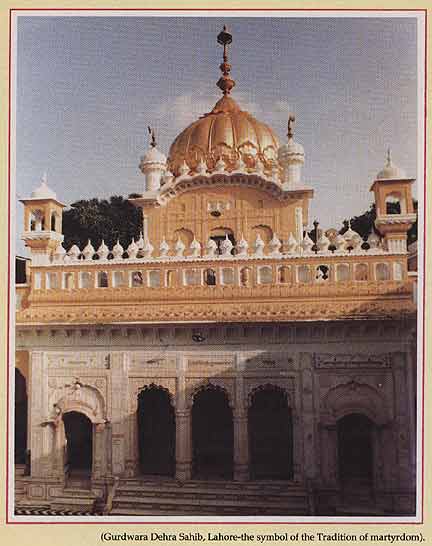
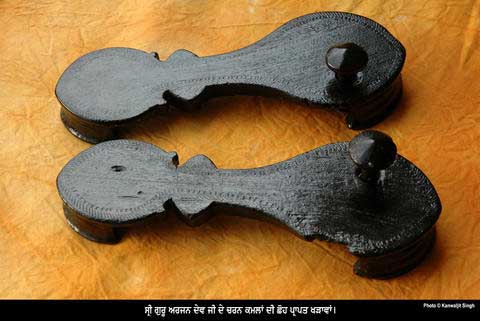
Khardawan - wooden shoes of Guru Arjan - (courtesy Prof Balwinder Singh)
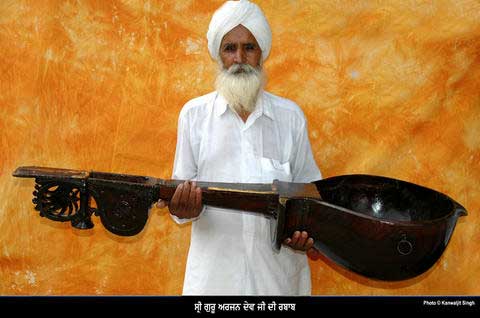
The Rabab of Guru Arjan (courtesy Prof Balwinder Singh)